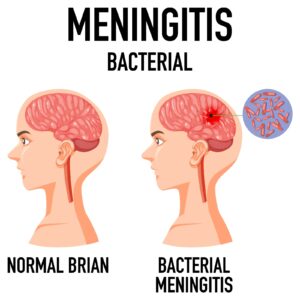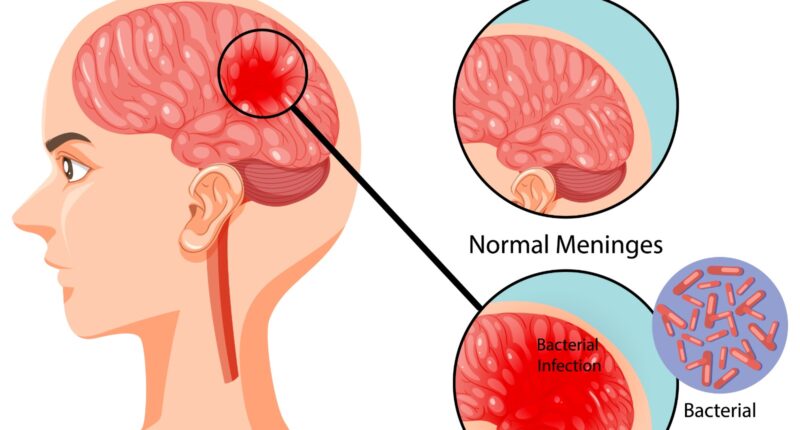Meningitis is a life-threatening condition that inflames the protective membranes covering the brain and spinal cord. Despite existing vaccines, it remains a significant public health concern, particularly in areas with limited access to healthcare. The development of a new vaccine for meningitis could represent a breakthrough in disease prevention, offering hope for reducing the incidence and impact of this serious infection. Here’s what you need to know about this promising development.
Understanding Meningitis
Meningitis can be caused by various pathogens, including bacteria, viruses, and fungi. Bacterial meningitis is the most severe form and can lead to serious complications such as brain damage, hearing loss, or learning disabilities. It is crucial to prevent and treat this condition promptly to minimize its devastating effects.
Current Vaccines and Their Limitations
Several vaccines are currently available to protect against different types of bacterial meningitis. These include:
Meningococcal Vaccines: These vaccines protect against Neisseria meningitides, the bacteria responsible for meningococcal meningitis. They cover different serogroups (A, B, C, W, and Y).
Pneumococcal Vaccines: Target Streptococcus pneumoniae, which can cause pneumococcal meningitis.
Haemophilus Influenzae Type B (Hib) Vaccine: Prevents meningitis caused by Haemophilus influenzae type B.
While these vaccines have significantly reduced the incidence of meningitis, gaps remain. Not all serogroups of meningococcal bacteria are covered, and vaccine coverage is not universal, particularly in low-resource settings.

The Promise of a New Vaccine
The development of a new vaccine for meningitis aims to address these gaps and enhance global protection against this deadly disease. Researchers are focusing on creating a more comprehensive vaccine that offers broader protection against multiple strains and is accessible to more people worldwide.
Key Features of the New Vaccine
Broader Coverage: The new vaccine is designed to protect against a more comprehensive range of meningococcal serogroups, potentially including those not covered by current vaccines. This broader coverage can significantly reduce the incidence of meningitis outbreaks.
Improved Accessibility: Efforts are being made to ensure the new vaccine is affordable and accessible, especially in low- and middle-income countries where meningitis is more prevalent. Partnerships with global health organizations and funding initiatives aim to make the vaccine available to those who need it most.
Enhanced Immunogenicity: Advances in vaccine technology are being utilized to create a vaccine with improved immunogenicity, meaning it will provoke a stronger and longer-lasting immune response. This can lead to better protection over time.
Simplified Administration: The new vaccine may require fewer doses or be easier to administer, making it more practical for large-scale vaccination campaigns and routine immunization programs.
Impact on Public Health
The introduction of a new, more effective meningitis vaccine could have a profound impact on public health. Potential benefits include:
Reduced Incidence of Meningitis: Broader protection means fewer cases of meningitis, lowering the disease burden on individuals, families, and healthcare systems.
Prevention of Outbreaks: Comprehensive vaccination can prevent outbreaks, especially in regions known as the “meningitis belt” in sub-Saharan Africa, where periodic epidemics occur.
Lower Healthcare Costs: Preventing meningitis through vaccination is more cost-effective than treating the disease and its complications. This can free up resources for other critical health needs.
Improved Quality of Life: Reducing the incidence of meningitis means fewer people will suffer from its debilitating complications, leading to better overall quality of life and productivity.
Ongoing Research and Development
The development of the new meningitis vaccine is the result of extensive research and collaboration among scientists, healthcare professionals, and global health organizations. Clinical trials are underway to assess the vaccine’s safety, efficacy, and optimal dosing regimens. These trials are crucial for ensuring the vaccine meets rigorous standards before it is approved for widespread use.
Conclusion
The potential availability of a new vaccine for meningitis represents a significant advancement in the fight against this life-threatening disease. With broader coverage, improved accessibility, and enhanced immunogenicity, the new vaccine could dramatically reduce the incidence and impact of meningitis worldwide. As research progresses and clinical trials yield positive results, there is hope that this breakthrough will soon translate into real-world benefits, saving lives and improving public health on a global scale. Stay informed about the latest developments in vaccine research, and consult healthcare professionals for the best ways to protect yourself and your loved ones from meningitis.









